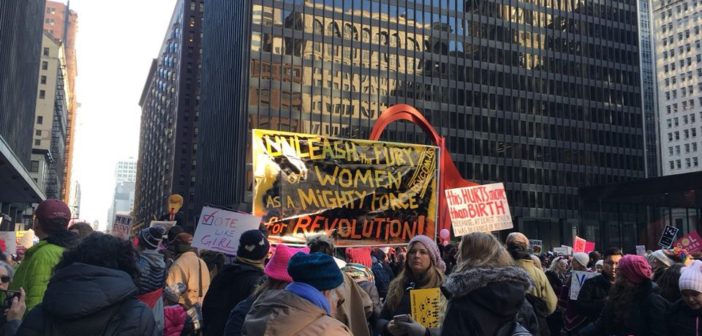Early in the morning, a group of North Central students were hiking, signs and all, down the street to catch a train to the city for the Women’s March in Chicago when a woman stopped them and asked if they could use a ride.
“We were like ‘Oh my God, yes, please’,” said Kennedy Taylor (‘19). “It was so sweet. It was the perfect introduction to the comradery that we would be feeling all day.”
Around 300 thousand people streamed into the city for the protest, numbers eclipsing even 2016’s rally after President Donald Trump’s inauguration. “Last year people just took to the streets in a more spread-out fashion,” said Manilyn Gumapas (‘18). “This year, it was a bit more organized in that there was one designated route that we all followed.”
Despite the sheer size of the crowds, those smaller moments still shined through for the students attending. “I was talking to complete strangers throughout the duration of the rally and march,” said Gumapas. “It was great to be in a massive group of people all brought together with one common goal: to demonstrate support in women’s rights and social justice.”
Taylor, an English and Secondary Education major, was particularly impacted by a teacher she met at the march and the sign that she was hoisting. “We were talking about how you can bring these experiences into the classroom, which is really important to me,” said Taylor.
People from a plethora of walks of life were represented within the sprawling crowd, even among the North Central students in attendance. Students from Mosaic, College Democrats and Students for Social Innovation among others made the trip to the city.
A host of different speakers took the stage at the march to speak in solidarity, from Illinois politicians like Cook County State’s Attorney Kim Foxx to artists like Ari Asfar and the cast of “Hamilton” in Chicago.
However, it was actually a speaker that came to North Central the day before the Women’s March, CNN contributor and author Marc Lamont Hill, that spurred Taylor to come to the rally herself. She was struck by a remark Hill made about how it’s not enough to just share things on social media if you’re not actually going out to learn more and stand up for what you believe in. “You have to be there and bring that experience back to further those discussions,” said Taylor.
One of the other topics that Hill spoke about at Wentz Concert Hall was intersectionality, which is something that Gumapas feels is crucial to the themes of the Women’s March. “(It’s) one thing I feel can never be talked about enough with regards to the feminist movement,” she said. “When considering feminism and the fight for women’s rights, we have to be conscious of all intersecting identities, whether that’s class, race, ability, etc.”

